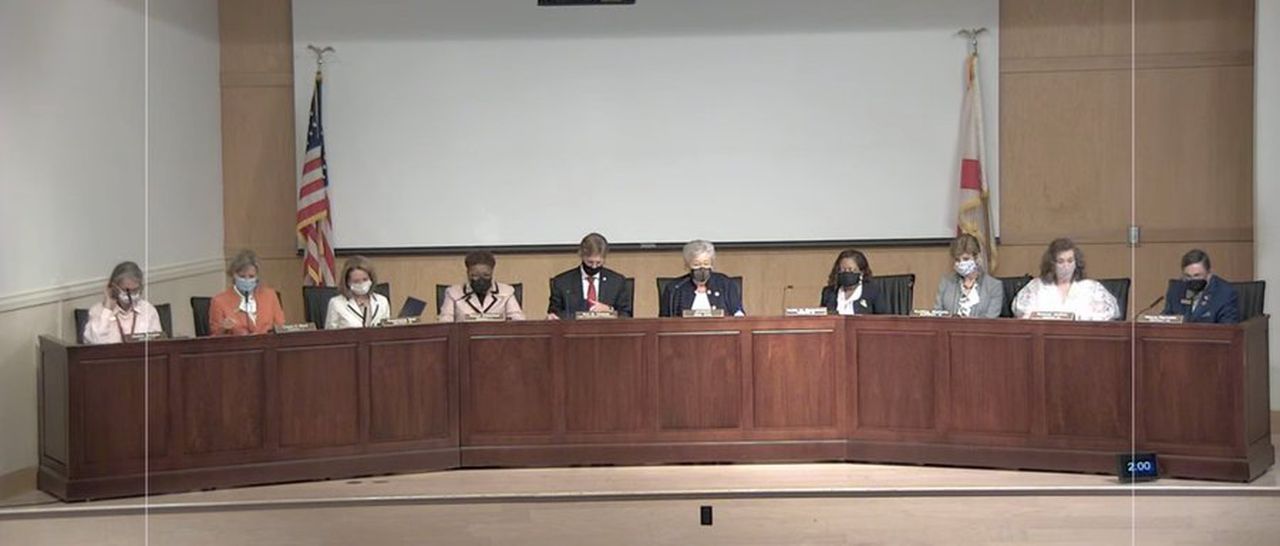Mooney, Long win Alabama state school board races
Kelly Mooney and Allen Long have won their Republican primaries for the State Board of Education, according to unofficial results from the Alabama Secretary of State’s office. Because there are no Democratic challengers, both winners will be seated in January for a four-year term.
Mooney appears to have avoided a runoff with 51.2% of the vote in the District 3 Board of Education seat, defeating Ann Eubank, Melissa Snowden and Charlotte Meadows, according to the Alabama Secretary of State’s unofficial online results. Longtime incumbent Stephanie Bell, who endorsed Mooney for the seat, did not run for re-election.
District 3 includes Bibb, Chilton, Coosa, Elmore and Shelby counties, as well as parts of Jefferson, Montgomery and Talladega counties.
“[Education] has always been my heartbeat,” Mooney told AL.com last month.
Long, with 61% of the vote, defeated Oscar Mann and Doug Bachuss for the District 7 seat, which includes Lauderdale, Colbert, Franklin, Lawrence, Morgan, Marion, Winston, Walker, Fayette, Lamar and parts of Tuscaloosa and Jefferson counties.
Long will replace incumbent Belinda McRae, who also chose not to run for re-election.
Mooney is formerly a Briarwood Christian School educator and administrator, and is currently a client specialist at OneAscent Wealth Management.
“I feel like it’s time to use this passion and commitment on the Alabama State School board to give our children the best opportunity for success in the classroom which translates to success in life,” Mooney told AL.com.
In a February interview with AL.com, Mooney said she wanted to remove Common Core when asked about how to improve math and reading scores.
“We really do need to get that out of it and get back to basics,” she said. “We tried experiments with our children in education through the implementation of national standards, but they took us on a detour in our common sense curriculum. I think we need to raise the standards and not lower them and work harder on that.”
Alabama stopped using official ‘Common Core’ standards a decade ago. Recent laws, including the Literacy and Numeracy acts, further adjusted what Alabama students learn in reading and math.
She also said in response to questions about school libraries and book challenges that parents and their children should discuss gender, politics, and religion at home, and that all decisions about book challenges should be made by local school districts.
Long practices medicine, specializing as an ear, nose and throat doctor in the Shoals area for more than 30 years. He served as a trustee for the University of North Alabama from 1994 to 2006 and for Shoals Christian School from 2001 to 2016.
When asked by AL.com in February why he was running for the State School Board, he spoke about his six grandchildren who, he said, “have enjoyed a blessed and fruitful career and life.”
“I see, at least in this upcoming generation, I’m not sure that they will have the same opportunities and freedoms that I’ve enjoyed,” he said. ” And I feel like someone needs to step forward to continue to make certain that the next generation has the same opportunities and freedoms to enjoy their life and their families, as I have enjoyed in my lifetime.”
When asked about his recommendations for improving Alabama students’ proficiency in math and reading, Long said students shouldn’t automatically be promoted to the next grade because they’re a year older, but instead “somewhere you have to say, ‘we’re not getting that done. If we’re not, let’s face the facts. Let’s make a plan.”
He also discussed bringing back retired teachers to help struggling students. Alabama law restricts how much money a retired teacher can be paid before they risk losing retirement benefits, but Long said he supports making changes to incentivize “experienced teachers” to return.
Referring to the Literacy Act, he said he knows students will need extra help. “We can’t just stop everybody at the third or fourth grade when they can’t read at that level unless we have teachers to take care of that overflow at those levels.”
State School Board members will be sworn in in January 2025 for a four-year term. There are no term limits on the role.
